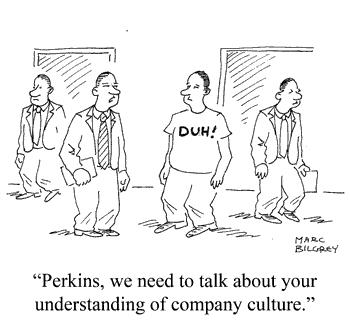Why Company Culture Matters to Business Value
Shared Values and Employee Practices Drive Increased Productivity, Loyalty, and Best Customer Service
The shared values and practices of employees in a company have real value that can be just as critical to a company’s success as its physical assets and market potential. Employees who passionately enjoy their work tend to be more productive, have increased employer loyalty, and offer better customer service. Over time, these factors can build or destroy a company. Here’s how.
One of the least understood and a critical driver of business value is your company’s culture. Great brands, great products and services that promote customer loyalty are not enough for a robust bottom line. When valuing a company, the obvious drivers are assets, potential, and sustainability. Another area might be the shared values and practices of the employees in a company. F. John Reh (senior executive and contributing blogger to www.about.com) states a culture can build or destroy a company over time. As a critical driver of business value, the culture of a company is important and needs to be a priority for owners and/or senior management.
Remember Steve Jobs returning to Apple Computer? The “white knight” used his visionary products and desire for design perfection to motivate employees in changing the ways of listening to music and connecting with others.Â
How about Louis V. Gerstner, Jr. of IBM fame? In 1993, “Big Blue” was the equivalent of an ocean liner of fiefdoms focused on building office machines. Over the last 19 years, IBM has become a more cooperative and highly profitable business based on SAAS, software as a service. IBM was on the brink of running out of cash Gerstner states in his book, Who Says Elephants Can’t Dance. Once he stabilized the company’s cash flow, he focused on changing the culture that helped optimize the long-term value of IBM. Gerstner outlined in his biography that a company culture having an environment of cooperation, fun, innovation and is results-oriented will drive the overall company value to tremendous heights.
As Mr. Reh mentions in his blog, businesses with adaptive, flexible cultures working in line with clearly identified goals regularly out perform their peers. Some surveys, according to Reh, show that top, adaptive, culture-aligned companies outperform their peers by 200 percent, which can filter down to building their financial value at a similar rate.Â
Employees and management who desire to have high-functioning culture are the qualities of great, highly valuable companies. These companies are employers of choice and businesses valued at a premium because the companies are running at optimum effectiveness in providing product or service to their customers. Potential buyers of companies want to buy something great because “greatness” is also highly profitable and has higher propensity to be a long lasting bottom line “growth engine” for the acquiring company.
Jack Eastwick, MBA, SPHR, a local area human resources (HR) consultant, understands the importance of culture in a company. Early in his career as an aeronautical engineer building airplanes, he quickly saw the relationship between productivity and management practices. Without a culture of involvement and purpose for employees, management is not helping to create the productivity that will drive financial stability for the company.
 An example of Jack’s work is assisting companies recruit and manage their human resource processes to maximize productivity and improve communication/fun for the employees in the company. He has helped turn around a large, middle-market company’s HR within a short period of time, roughly four years, increasing productivity using a smaller workforce totally engaged to achieve the business goals.
An example of Jack’s work is assisting companies recruit and manage their human resource processes to maximize productivity and improve communication/fun for the employees in the company. He has helped turn around a large, middle-market company’s HR within a short period of time, roughly four years, increasing productivity using a smaller workforce totally engaged to achieve the business goals.
As Eastwick understands, many people wish to be part of an organization that is something bigger than themselves and are searching for not only a good standard of living, they also want work that they are passionately involved in to improve and make a difference for the customers and their team mates. When companies achieve this status, the value of the company increases along with productivity, customer service, and employee loyalty.
Scott T. Wait, CPA,  and a merger and acquisition advisor for companies, has seen a direct connection between company value and a company culture of “engaged” employees. When working with potential buyers of companies, such as private equity groups and strategic buyers, i.e. competitors or companies looking to enter a new market or obtain strategic synergies, Mr. Wait knows to look for that elusive “greatness” along with other indicators when valuing a company.
For example, a decades-old company could be valued on its factory (land and building), manufacturing equipment, vehicles, and inventory (raw materials & finished goods). How would you put a value on a modern day company “manufacturing” computer software? They are usually sitting in a leased building,or have people working remotely from home with no tangible assets like land or buildings. The only fixed assets might be laptops, furniture, and those elusive assets called employees.Â
Those people writing software solutions for your customers may choose, at any time, not to work for your company for a myriad of reasons. How do you keep them coming back to work every day? Extrinsic rewards such as competitive pay and good benefits are part of the answer. However, the intrinsic rewards of corporate culture keep people excited and desiring to return to work every day.
Yes, your company culture does matter and is a critical driver of your bottom line. HR and Financial Advisors agree. Ask Scott and Jack. They have strategies to drive up business value and transform company teams to a productive workforce.
Scott T. Wait, a Managing Director with The McLean Group in the Reno, NV office, can be reached at 775.825.7637, or swait@mcleanllc.com. Jack Eastwick, Expert System Consultants, LLC in Reno, NV, can be reached at 775.786.3378, or jeastwick@esc-hr.com









